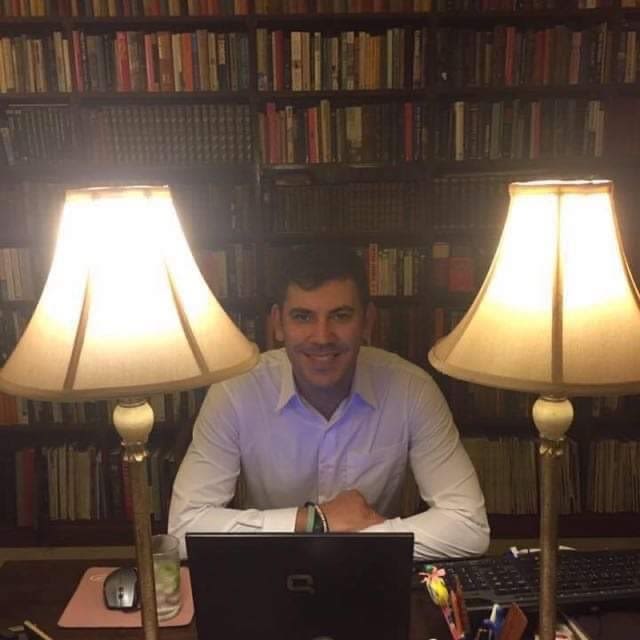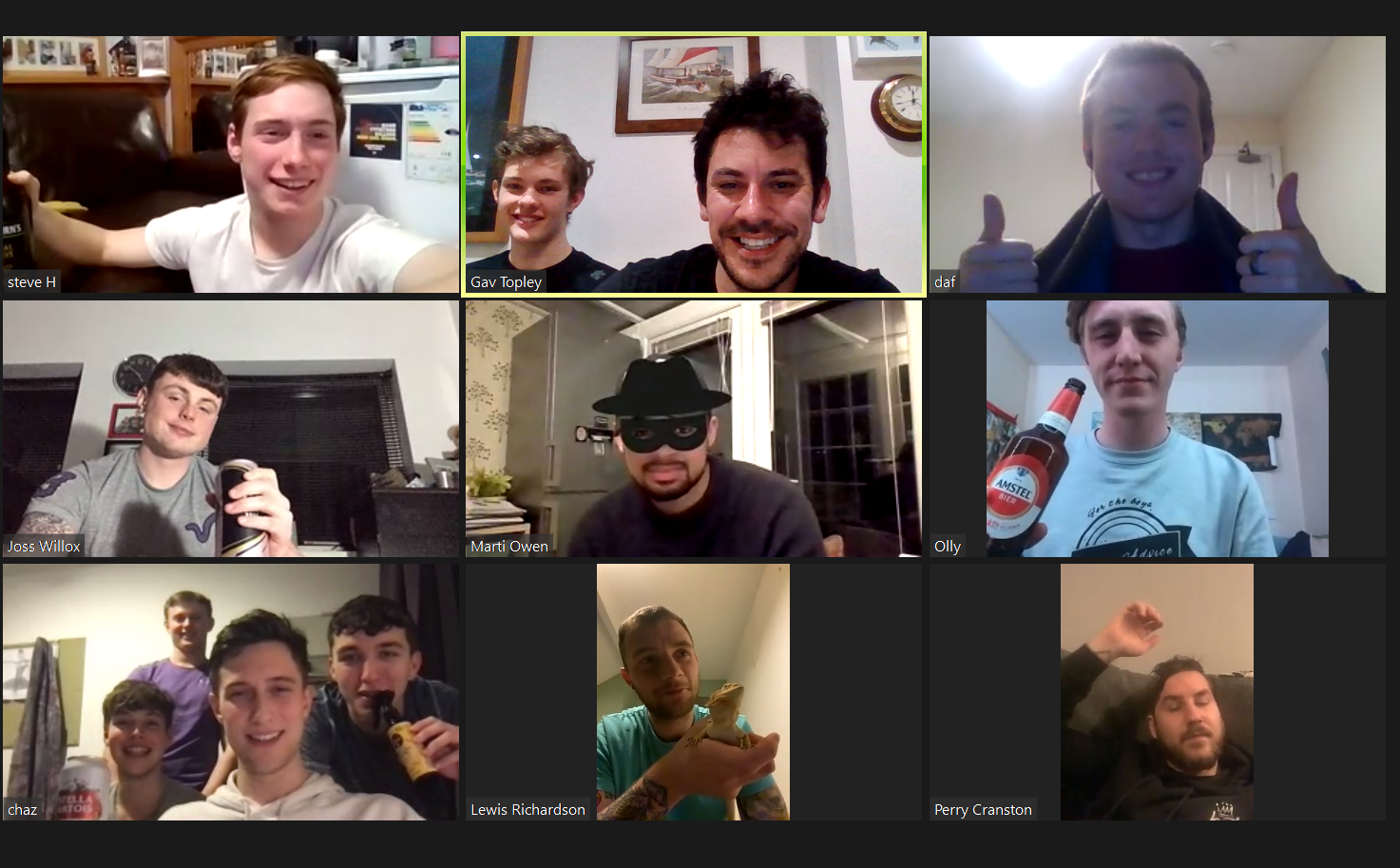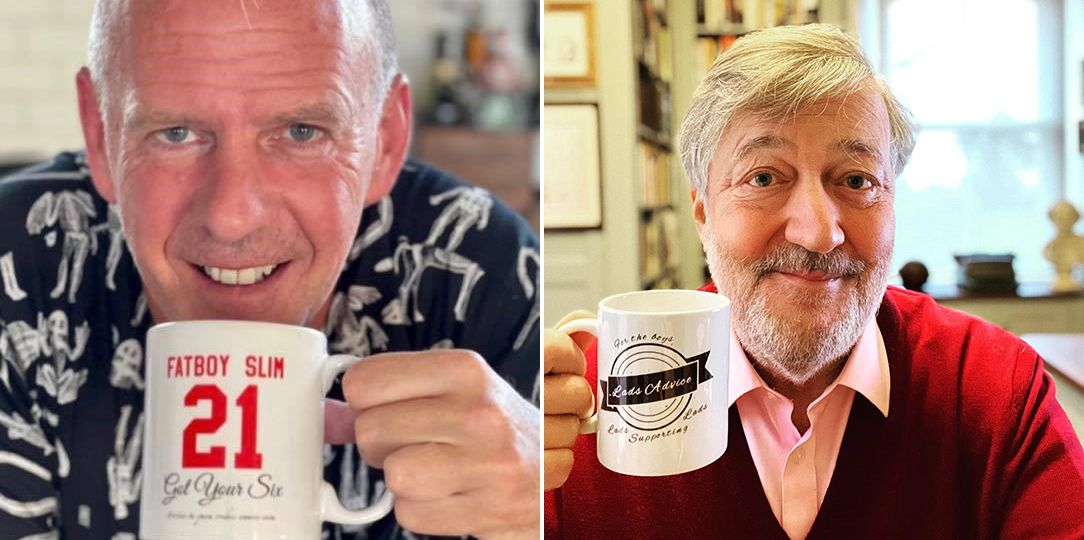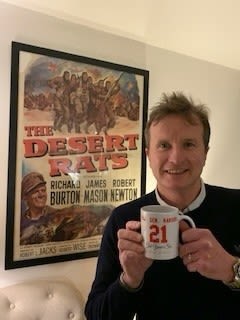

Advice squad
How the pandemic led one Cambridge student to create an online space for men to discuss mental health issues free from judgement.

When COVID-19 first forced the country into lockdown, Gav Topley, a research student at the Faculty of Education whose work examines the challenges facing young men from lower-income settings, became concerned about the impact on mental health.
He decided to found Lads’ Advice: an online peer support group where men can share problems in a safe, encouraging space. Two years on, it has transformed life for many of its 5,000 members.
23 October, 2021. At St John’s College, Cambridge, Joe Dilling, an army medic soon to leave the service and start work as a personal trainer, stands up to speak at an all-male, candle-lit, black tie dinner. To a casual observer, it seems a classic, clichéd, rendering of the traditional Oxbridge experience; but more is going on here than meets the eye.
For a start, Joe has struggled with a fairly severe stammer his entire life. “I got told to keep this to 10 minutes,” he begins as the Hall falls silent, “And I’m like,” (a pause, as he struggles to get the words out,) “…f*cking hell. At least give me 20 so I’ve got enough time.”
This is Joe’s first ever attempt at public speaking, and he’s making it in front of a General, a Major, three Cambridge professors and – most importantly – about 50 of his peers. He explains how he overcame his reluctance to do so when he saw a social media post about how people with stammers “don’t have a voice”. “If you have an imperfection, a weakness, a fault… it’s not actually a fault; it’s you,” he reflects. “It’s what you are. You can’t change it, but you can work on it every day. Joe last year wouldn’t have spoken in front of 50 people, but that’s growth.”
Joe Dilling speaking at the event at St John's College, Cambridge
Later, Gav Topley, the Cambridge PhD student who organised this event, receives glowing feedback from some of the academic staff who were there. One senior Fellow writes: “The speeches would have been totally unexpected in any context, not just in the Army. I didn’t know what to expect, but I began to understand the nature and scale of the mental health problems with which you are grappling, and your remarkable success in setting up this network.”
The network is Lads’ Advice: a peer support community that Gav established during the first COVID-19 lockdown, with friends and colleagues Charlie Kerry-Pickering and Steve Hughes. The dinner at St John’s, (Gav’s college), was the group’s inaugural in-person event, which brought together members from across the country who have previously only met online.
"I want to understand how different sectors – the education system, the youth justice system, and the Army – can combine their knowledge and experience to give these young men better opportunities and better mental health."
In general, the group operates on Facebook, providing a safe space where men can connect, discuss what are often deeply personal issues that they feel they cannot divulge elsewhere, and get information about support. Roughly half the membership, including Joe and Gav, are either soldiers or veterans; others have simply run into difficulties – perhaps with relationships, employment, or homelessness – and join seeking friendship and guidance.
As a concept, Lads’ Advice dovetails both with Gav’s research at the University’s Faculty of Education, and his life experience. He was raised in a former mining community near Mansfield, where, he says, going to university was simply never discussed. Accordingly, he left school at 16 and – after a brief stint as a falconer in North Yorkshire – joined the army as a Veterinary Technician. He served in Kosovo shortly after the 1998/9 crisis, and across Europe. He remains a reservist today.
After the Army, Gav took various jobs linked to education and social care, including a stint working with young offenders. Having always wondered about university without quite knowing how to get there, he now had a CV sufficiently impressive to persuade the leaders of a media and communications course at Bournemouth University to take a chance on him as a mature student. A Masters, in interdisciplinary childhood studies at Leeds followed, and he was accepted for a PhD at Cambridge in 2019.

Gav Topley
Gav Topley
In part, his research addresses an ongoing public and policy debate about whether the British Army, as the only armed service in Europe to recruit boys as young as 16, should continue to do so. “There’s a lot of support for raising the recruitment age,” Gav says. “The problem is that it’s generally discussed by people from very different social backgrounds to the young men it affects. For some of them, the Army is a turning point in their lives that gives them structure and purpose for the first time. Their voices aren’t really part of the conversation.”
Overwhelmingly, these boys come from poorer backgrounds where interlinked challenges including deprivation, crime, substance abuse, and poor mental health all limit their life chances. Gav is undertaking a comparative study of young soldiers and boys of a similar age within the youth justice system. “A strikingly high percentage of the soldiers I speak to say that if they weren’t in the Army, they’d be dead, in prison, or on drugs,” he says. “I want to understand how the different sectors – the education, the youth justice system, and the Army – can combine to give them better opportunities and better mental health.”
"The idea was to make it a place where you could hang out and share a joke. But if you needed help you could ask, without fearing ridicule."
At the start of the COVID-19 pandemic, Gav became concerned about the emotional consequences that prolonged social isolation might have for precisely this type of young person. Recent data had just been released showing that the suicide rate for men in England and Wales was at its highest in two decades. Thankfully, that rate has so far not risen further, but cases of depression, anxiety and stress all have, and men continued to account for around 75% of suicides in 2020. The issue is deeply complex, but wider research seems to indicate that often men choose to take their own life having struggled to express anxieties and vulnerabilities openly, in a society that still impresses upon them the notion that being male means being strong, silent and resilient.
The Facebook group Gav created was, at first, deliberately informal, partly because he was aware of the dangers of attempting anything too heavy-handed. “We were trying to reach young men who, were this a formal support group, probably wouldn’t join because that would mean admitting they needed support,” he says. “The idea was to make it a place where you could hang out and share a joke, achievements, experiences. But if you needed help you could ask, without fearing ridicule, and we could signpost it.”
Gradually, they started to emphasise the support aspect more, particularly after Gav – who personally found the first lockdown a real struggle – shared how he was feeling. As other group members began to speak about their anxieties as well and found a receptive environment in which to do so free of judgement, even more followed suit.

Lads' Advice members meeting on Zoom
Lads' Advice members meeting on Zoom
Such discussions need handling with care. “Most of the conversation is fine but there are cases where someone might try to draw out allegiance by speaking negatively about another person – like an ex-partner, for example,” Gav says. “I’m always conscious that we’re called Lads’ Advice, and while that term gives people in the group a sense of community and belonging, outside it can have negative connotations with chauvinism. We – I and the other moderators – are very careful about gently but firmly challenging anything that might be heading in that direction, and this is almost always well-received.”
At the end of 2021, Lads’ Advice had more than 5,000 members, with more joining every month. As this suggests, the profile of the group is rising rapidly: Gav has even managed to win celebrity endorsements from public figures who have spoken out on men’s mental health in other contexts, such as Norman Cook (AKA Fatboy Slim) and Cambridge alumnus Stephen Fry.

Norman Cook, aka Fatboy Slim, and Stephen Fry have both voiced support for Gav's work.
Norman Cook, aka Fatboy Slim, and Stephen Fry have both voiced support for Gav's work.
Peer support is now firmly to the fore. The group has helped homeless young men find and furnish places to live; unemployed people to access education or find jobs; and supported homosexual members to share that identity publicly for the first time.
Sadly, there have also been several instances in which Gav or other members became aware that someone in the group had reached crisis point and had both the means and intent to take their own life. In each case, they alerted emergency services or the relevant chain of command within the Army. Some cases were touch-and-go, but all of the individuals are alive and receiving support. Without the network, things might have been very different.
“Those are cases where we might act, but a lot of the rest is just providing signposting, support and a listening ear,” Gav says. “If someone’s bereaved, has an addiction issue or is struggling with depression, Lads’ Advice is a place to talk about it while also guiding them towards professional organisations who can help. But that seems to matter: we’ve found it makes a huge difference to have a group of people who will encourage you to take the necessary steps to get where you’re going.”
Some of the feedback he receives underlines how important that provision can be. One message, posted by a Lads’ Advice member a few months ago, for example, reads: “End of last year, I was a mess… crying all day, drinking all day, f*cking everything off… You lads did to me what others who were right next to me couldn’t. Where I’m from I’m expected to be an alpha male, not allowed to talk about how I feel, etc. This has really helped me. Thanks to the admins and thank you, lads.”

Major General Paul Nanson, former CO of the Royal Military Academy, Sandhurst, with his Lads' Advice mug.
Major General Paul Nanson, former CO of the Royal Military Academy, Sandhurst, with his Lads' Advice mug.
The value of such a community was further articulated by Major Andy Heckles, another speaker at the dinner in October. As he explained at that event, Maj. Heckles struggled with multiple mental health issues when he returned to active service following a mild brain injury, but thanks to the intervention of subordinates and friends, is now company commander at the Army Foundation College, Harrogate. “Getting help hasn’t made me any less of a person, but it’s taken me a long time to realise that,” he told the group. “The support network is there. We have to make sure that we don’t suffer in silence.” Gav points out how powerful it was for younger soldiers who might otherwise have been reticent about seeking help to hear an officer speak openly about his own experiences in this way.
Major Andy Heckles speaking at the dinner at St John's.
The most recent Lads’ Advice initiative has involved raising money for PAPYRUS; the national charity for the prevention of young suicide. Gav and Charlie have taken on the daunting challenge of a sponsored climb of Mount Kilimanjaro, while others have done everything from sponsored runs to cake sales as they seek to raise £20,000 for the cause.
Encouragingly, Gav has also received plenty of engagement and support for the initiative from fellow Cambridge students, especially those at St John’s. “Quite a few are now members, or involved in other ways,” he says. “It’s great to see them helping the other guys in the group.”
Support Lads’ Advice fundraising for PAPYRUS.
Find Lads’ Advice on Facebook, Twitter and Instagram. A new podcast series, Got Your Six: Lads Advice Encounters with Gav Topley and Friends, will be available on Spotify, iTunes, YouTube and other outlets from Sunday, 23 January.